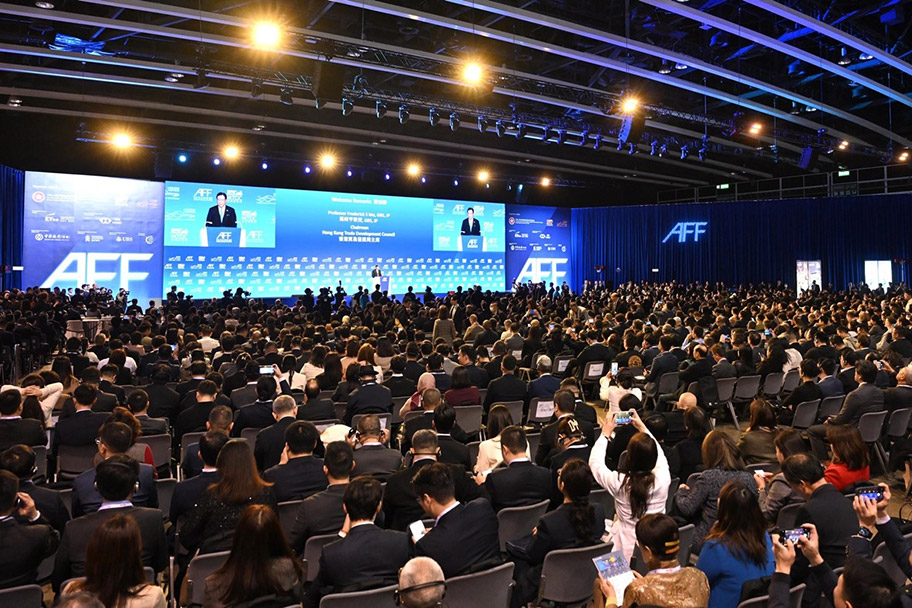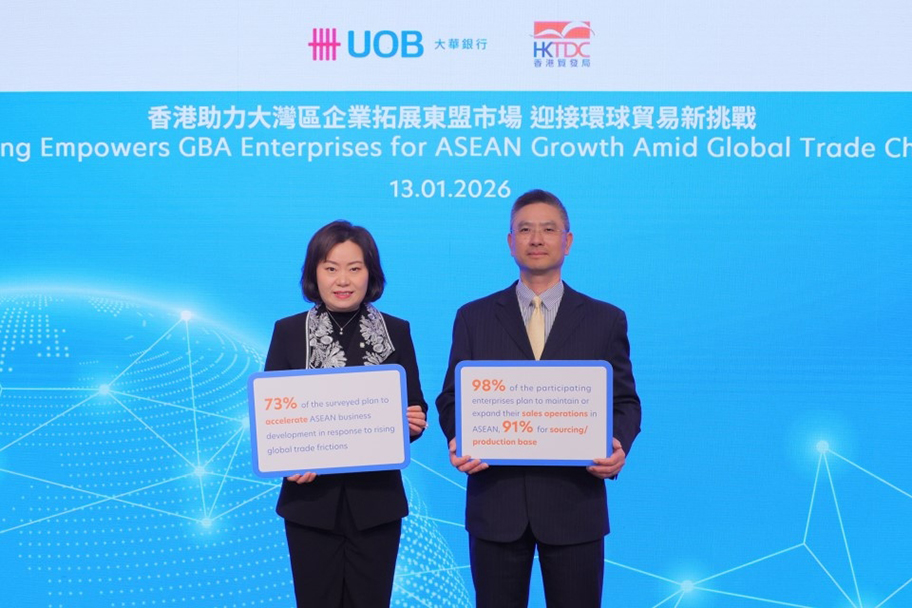RCEP, a victory of multilateralism – are Chinese businesses ready?
RCEP, a victory of multilateralism – are Chinese businesses ready?
After an eight-year marathon of negotiations, the Regional Comprehensive Economic Partnership (RCEP) covering 15 countries including China, South Korea, Japan, Australia, New Zealand, and ASEAN, amounting to a third of the world’s GDP, was finally signed on 15 November 2020.
The signing of the world’s largest free trade agreement is an important step towards protecting multilateralism and building an open economy, and a significant milestone in regional economic integration and stability of the global economy. It also brings opportunities and challenges to Chinese companies that are going global, especially set in the current day of constant clash between globalism and protectionism.
In an interview with Wallstreet CN, Jean Lu, Managing Director, Co-Head of Client Coverage Corporate, Commercial & Institutional Banking, Standard Chartered Bank (China) Limited said, “To Chinese companies, RCEP and their effort in local communities are both a means and an end. It isn’t because of RCEP that Chinese companies will invest in these markets, it is rather because Chinese companies have been investing in these markets for many years to forming industrial clusters locally that made the signing of RCEP possible. The signing of RCEP would bring a host of benefits to local Chinese companies, as well as development opportunities for companies in the region. Hence Chinese companies must prepare themselves to compete on a wider stage.”
How can financial institutions support Chinese companies go global after the signing of RCEP?
How can Chinese companies localise after the signing of the RCEP?
It’s been a few hundred years since Chinese businesses made their way in ASEAN, which is the number one destination for Chinese foreign investment due to the two regions’ similar culture and geographic proximity, as well as the potential growth in these markets.
In the first half of 2020, China’s imports and exports to ASEAN reached 2.09 trillion yuan, a 5.6% year-on-year increase, accounting for 14.7% of China’s total foreign trade. Surpassing the European Union, this was the first time ASEAN become China’s biggest trade partner after surpassing the U.S. in 2019, demonstrating how important economic and trading relations was to both parties.
A lot of Chinese companies have been investing in ASEAN for many years. Researcher of the European Studies Research Institute of Renmin University of China, Associate Professor of the School of International Trade and Economics, Central University of Finance and Economics, Chunsheng Liu suggested that during investment, whilst Chinese companies benefit from cheap labour and local policies that attracts foreign investment, they also face a series of problems such as financing, taxation, environmental protection, exchange rate fluctuations, conflicting accounting system, liquidity management, cultural differences, employee management, and operating cost control.
How do Chinese companies find a suitable bank to provide financial support in ASEAN?
Standard Chartered has operated in ASEAN countries for many years, and is the only international bank that has presence in all 10 ASEAN countries, moreover, the Bank has served in countries such as Singapore, Myanmar, India, Philippines, Malaysia, Thailand, Vietnam, etc. for more than 100 years.
With such consistency and longevity, Jean Lu expressed, “Standard Chartered has a strong local understanding and can provide advice on areas like regulations, policies, culture to Chinese businesses. In other words, we are the local guidebook to help Chinese companies avoid stepping on land mines.”
“To share an interesting example,” said Jean Lu, “Standard Chartered successfully supported a Chinese company’s subsidiary in Malaysia to issue a green Islamic bond as the lead underwriter. The funds raised were used for the upgrading of local solar photovoltaic power plants, and heeding to our advice, a buffer zone specially used for crop planting is set up around the plant. The project also meets the requirements of the ASEAN Sustainable Social Responsibility Project, whereby while providing clean energy and promoting local economic development, it also brings additional income to local farmers. In consideration of all these benefits, there is no reason for us not to support such a positive and beneficial project.”
From years of domestic photovoltaic power station operational experience, Chinese businesses learnt that planting crops around solar panels can not only prevent the sand and gravel rolled in the air from causing harm to the solar photovoltaic panels, but can also make full use of the water used to clean the solar photovoltaic panels to irrigate crops. Additionally, because the photovoltaic power station covers a large area, the establishment of an agricultural area in the buffer zone between the power station and the residential area can also make full use of precious land resources.
The above example suggests that Chinese companies that go global are no longer limited to outputting construction capabilities, they also need to shift to outputting more of their operation and management capability to combine their experience in China with the ASEAN market environment in order to sustain long-term local investment.
Green sustainability: Earlier research and invest, avoid risks better
When we talk about green finance and green development, people always consider it as a company’s social responsibility, a cost rather than a benefit.
However, Jean Lu noted otherwise, “We must break the misconception about green financing. Currently, the cost of renewable energy such as solar and wind power is decreasing quickly. With the lower cost of renewable energy, it presents an opportunity for developing countries to skip the high emission and high pollution stage and straight to an era of clean energy.”
Jean Lu continued, “This isn’t just about being responsibility to the environment, from a business perspective, these are opportunities. The requirement of ESG is getting higher, the number of sustainability projects are increasing around the world, and relevant standards are being raised higher as well. If we continue to stay within our comfort zone and use fossil fuel, we will miss all these opportunities.”
Jean Lu said that if Chinese companies continue to do big, long-term and relatively high emissions projects overseas, the business itself may face risk in the future: “As the cost of clean energy continues to go down, the risk of these projects being replaced goes up. For high emission projects, the current business model may not work in the future, which brings long-term risk to financial institutions and businesses.”
“That is why not only are we encouraging businesses to undergo green transformation from a social responsibility standpoint, but even more so from a commercial standpoint. The earlier the transformation and to invest in research in this area, the better.” said Jean Lu.
Since the start of this year, several ASEAN countries have launched projects to encourage clean energy, including Vietnam, Malaysia, Thailand, and India, etc. For example, Thailand has made green renewable energy as a key element in its energy strategy, such as photovoltaic, wind, and biofuel energy industries. Jean Lu said, “I believe ASEAN green investment will continue to be a global investment hotspot, and Chinese companies will have a lot of opportunities.”
To support green finance and sustainable investment, not only does Standard Chartered have an independent clean energy team, it also has a dedicated team of sustainable financing to provide full financial support for Chinese companies to embrace local green opportunities. Other than providing financial services, Standard Chartered can also provide add-on value to Chinese companies with its advantageous network, client, and resource in ASEAN region.
Jean Lu said, “Benefitting from its unique advantages in ASEAN, Standard Chartered can partner with Chinese, and even global financial institutes as a coordinator to support Chinese companies’ investment in local green sustainability projects.”
For example, Standard Chartered supported a large private environmental protection energy investment operator in China by providing export buyer’s credit funds for a waste-to-energy project in Hanoi, Vietnam. The 75 MW Waste-to Energy plant with a processing capacity of 4,000 tons of waste per day and 4,800 tons of waste collection capacity per day, will be the country’s biggest waste-to-energy project, and will account for 55% market share of all operating and under construction waste incineration power plant in the country after completion.
RCEP, an important platform for the internationalisation of the Renminbi
Jean Lu said, “I think the RCEP will be an important platform for the internationalisation of the Renminbi.”
As investment and trading between China and ASEAN increase rapidly, the number of Renminbi settlements between the two parties has also increased significantly. According to the 2020 ASEAN Renminbi usage report published by the Guanxi Financial Institute in September 2020, the total Renminbi cross-border capital flow of ASEAN in 2019 was 2408.71 billion yuan, a 34.7% year-on-year increase; as of the end of 2019, Malaysia, Singapore, Thailand, Indonesia, Cambodia and the Philippines had included Renminbi in their foreign exchange reserves; China and four ASEAN countries including Malaysia, Thailand, Singapore, and Indonesia, had signed bilateral currency swap agreements; and Renminbi settlement arrangements had been established in four ASEAN countries, including Singapore, Malaysia, Thailand, and the Philippines.
By the end of 2019, there were 71 financial institutes participating in CIPS (Cross-border Interbank Payment System), and 248 ASEAN commercial banks established Renminbi settlement agency relations with 186 commercial banks in China.
Jean Lu said, “From the perspective of a financial institute, the RCEP will bring great convenience to regional investment and trading. We have also noticed that there are increasing number of Chinese companies building a regional treasury centre in ASEAN. As a lot of ASEAN countries have established Renminbi settlement system, local clients become increasingly acceptive of Renminbi during currency exchange or payment settlement. Hence the market share of Renminbi as a trading and investment settlement currency is expected to increase further.”
Standard Chartered can provide Renminbi services in multiple ASEAN countries, including Renminbi and local currency exchange and Renminbi settlement, etc. Standard Chartered has established a dedicated Renminbi internationalisation team with local experts in major offshore Renminbi centres around the world to connect with central banks and companies in China and other countries to share Standard Chartered’s insights and recommendations on Renminbi internationalisation.
Other than ASEAN, the Renminbi internationalisation within RCEP is also speeding up under the push of financial technology. Recently, to support China Baowu’s purchase of Australian iron ore, Standard Chartered utilized blockchain technology to issue the industry’s first cross-border letter-of-credit in offshore Renminbi.
Jean Lu said, “We also advise Chinese companies to consider Renminbi internationalisation as an important factor during local financing. If the projects that Chinese companies participate in can form a complete chain of Renminbi financing, Renminbi payment, and Renminbi settlement, a lot of countries would be willing to accept Renminbi settlement, which can bring convenience to both businesses and the supply chain.”
Final word
“The signing of RCEP was a victory of multilateralism.” said Jean Lu.
After the singing of RCEP, Chinese companies’ investment in ASEAN and other participating countries would be more convenient. As a corporation that has been investing in Southeast Asia for more than a decade and maintains a friendly relationship with Australia, New Zealand, Japan, and South Korea businesses, Standard Chartered can provide even better support to Chinese businesses’ local investment, particularly in green investment and Renminbi internationalisation.
This article is a translation, original article published in Wallstreet CN .
This material has been prepared by one or more members of SC Group, where “SC Group” refers to Standard Chartered Bank and each of its holding companies, subsidiaries, related corporations, affiliates, representative and branch offices in any jurisdiction, and their respective directors, officers, employees and/or any persons connected with them. Standard Chartered Bank is authorised by the United Kingdom’s Prudential Regulation Authority and regulated by the United Kingdom’s Financial Conduct Authority and Prudential Regulation Authority.
This material has been produced for reference and information purposes only, is not independent research or a research recommendation and should therefore not be relied upon as such, and does not constitute an invitation, recommendation or offer to subscribe for or purchase any of the products or services mentioned or to enter into any transaction.
Some of the information herein may have been obtained from public sources and while SC Group believes such information to be reliable, SC Group has not independently verified the information. Information contained herein is subject to change at any time without notice. Any opinions or views of third parties expressed in this material are those of the third parties identified, and not of SC Group. While all reasonable care has been taken in preparing this material, SC Group makes no representation or warranty as to its accuracy or completeness, and no responsibility or liability is accepted for any errors of fact, omission or for any opinion expressed herein. The members of SC Group may not have the necessary licences to provide services or offer products in all countries, and/or such provision of services or offer of products may be subject to the regulatory requirements of each jurisdiction. Any comments on investment, accounting, legal, regulatory or tax matters contained in this material should not be relied on or used as a basis to ascertain the various results or implications arising from the matters contained herein, and you are advised to exercise your own independent judgement (with the advice of your investment, accounting, legal, regulatory, tax and other professional advisers as necessary) with respect to the risks and consequences of any matter contained herein. SC Group expressly disclaims any liability and responsibility whether arising in tort or contract or otherwise for any damage or losses you may suffer from your use or reliance of the information contained herein.
You may wish to refer to the incorporation details of Standard Chartered PLC, Standard Chartered Bank and its subsidiaries at http://www.sc.com/en/incorporation-details.html.
© Copyright 2021 Standard Chartered Bank. All rights reserved. Copyright in third party materials is acknowledged and is used under licence. You may not reproduce or adapt any part of these materials for any purposes unless with express written approval from a member of SC Group.




